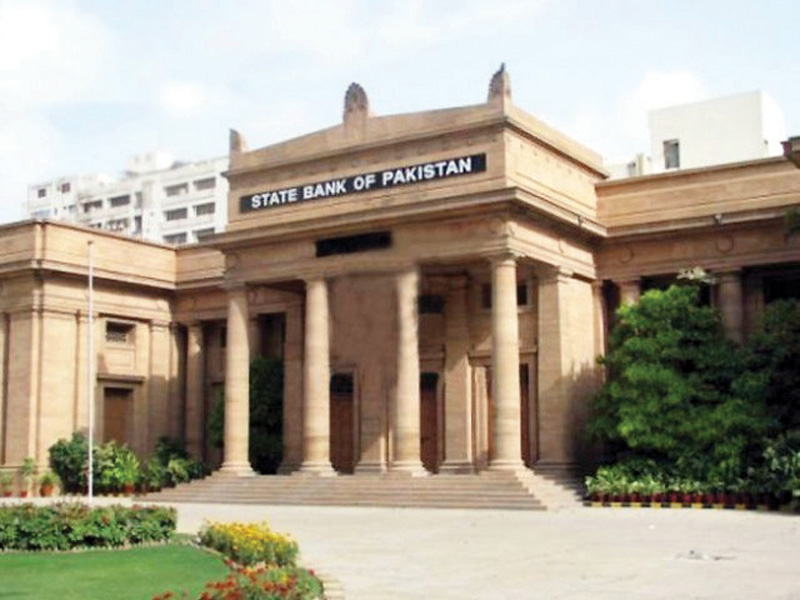KARACHI:
Pakistan’s central bank has said that economic activities have bottomed out in July 2023 and a silver lining is now clearly visible, suggesting an early economic recovery backed partly by the reduction in global commodity prices and higher international growth forecast.
The measures taken to cool down the economy in the previous year (FY23), including the tightening of monetary policy, would not let imports to grow sharply, it said. Secondly, the fiscal deficit will remain large in the range of 7-8% due to elevated interest payments against mounting debt compared to the government target of 6.5% for fiscal year 2023-24.
Amid the turnaround, the central bank kept its initial projection for economic growth unchanged at 2-3% for FY24, which was close to the International Monetary Fund’s (IMF) forecast of 2.5%, but lower than the government target of 3.5%.
In FY23, the cooling measures coupled with 2022 floods pushed economic growth to mere 0.3%, the third lowest growth rate in seven decades, while average inflation, measured by the Consumer Price Index, spiked to a multi-decade high.
In its Annual Report on the State of Pakistan’s Economy for Fiscal Year 2022-23, the State Bank of Pakistan (SBP) said “after a year of turbulence, Pakistan’s economic situation has started to show some early signs of improvement.”
Read Rupee at Rs279/$ as IMF review looms
“The high frequency indicators are suggesting bottoming out of economic activity from July 2023.”
According to the July 2023 World Economic Outlook, the prospects for global economic growth in 2023 have somewhat improved, compared to earlier projections. Similarly, the non-energy global commodity prices have eased compared to last year. “These trends may have positive implications for Pakistan’s economy.”
The country was able to secure a $3 billion standby arrangement (SBA) from the IMF towards the end of FY23, which helped to alleviate immediate risks to some extent. The initial disbursement of $1.2 billion under the SBA in July 2023, alongside $3 billion in bilateral inflows, helped reverse the declining trend in the SBP’s foreign exchange reserves.
The withdrawal of guidance on import prioritisation from end-June 2023, alongside gradual ease in foreign exchange position, is expected to somewhat ameliorate supply chain situation and lift growth in large-scale manufacturing (LSM) as well as exports.
Moreover, an expected rebound in cotton and rice production will support agricultural growth in FY24. To encourage cotton production, the government has announced a minimum price of Rs8,500 per 40 kg for the FY24 crop.
According to preliminary information, the incentive has resulted in an increase in cotton sowing area and is also likely to encourage farmers to scale up crop management practices despite rising prices of fertilisers and pesticides.
Similarly, favourable weather conditions and a steep increase in domestic rice prices incentivised growers to expand the area under paddy crop and hence production in the ongoing year.
The expansion in commodity producing sectors is expected to have a knock-on impact on services in FY24. However, the impact of various demand compression measures introduced in the past two years may contain the pace of recovery in economic activity.
The lagged impact of monetary tightening and other contractionary measures is expected to keep domestic demand in check. Moreover, the prospects of improvement in supply situation on account of likely increase in production of important crops and resumption of imports are expected to further moderate inflationary pressures in FY24.
In addition to the improvement in domestic supplies, a high base from last year and sluggish trend in non-energy global commodity prices are expected to help bring down inflation in the range of 20-22% in FY24.
“However, unforeseen climate events, adverse movements in global commodity prices, especially oil, and external account pressures are some important upside risks to this outlook,” the SBP said in the report. A tepid recovery in economic activity is likely to shore up revenue collection during FY24.
In the year, the government has envisaged to boost revenues by increasing petroleum development levy to Rs60/litre, and announcing higher rates for top income tax brackets, builders, developers and property, and introducing additional GST on unregistered businesses.
Published in The Express Tribune, October 24th, 2023.
Like Business on Facebook, follow @TribuneBiz on Twitter to stay informed and join in the conversation.

